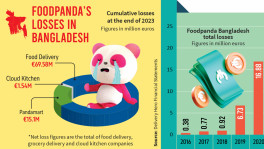Fuel prices cut as auto adjustment sets in
Prices will be fixed every month from now on

The government has reduced the prices of fuel oil as it introduced automatic fuel pricing in line with the global market.
The prices of diesel and kerosene have been reduced by Tk0.75 to Tk108.25 per litre. The price of petrol has been cut by Tk3 to Tk122 while octane by Tk4 to Tk126, according to a gazette notification of the Ministry of Power, Energy and Mineral Resources issued yesterday.
The revised rates will take effect from today. Prices will be fixed every month from now on with the new automatic system.
The government has launched the system according to the terms of the International Monetary Fund (IMF) for a $4.7 billion loan. Two instalments of the loan have already been released.
On 29 February, the Bangladesh Petroleum Corporation (BPC) issued a notification on Automatic Fuel Oil Pricing Guidelines.
According to the notification, the prices of all petroleum fuels – petrol, diesel, octane, kerosene, furnace oil, jet fuel, and marine fuels – will be set automatically based on the international market price.
It said octane and petrol are used in the country in large quantities in vehicles, hence their price is always kept higher than diesel as a luxury item.
The guidelines include details of automatic pricing structure, international price, moving average price, premium, operational expenses, financing, administrative and maintenance expenses, trade VAT, freight pool, dealers commission and transportation, and development fund and company margin.
In case of setting a price for any of the petroleum fuels, all the expenses, including the international market price, import tax, advance income tax and VAT, operational expense, finance, administrative and maintenance cost, the BPC's margins, VAT, and sale and distribution costs will be taken into account and then set a price.
According to sources at the Energy and Mineral Resources Division, fuel prices will be determined based on the average import price of refined fuel oil per barrel, which currently stands at $100.
They said there was an opportunity to reduce it a little more. However, real time pricing will be phased in to adapt to the new system without committing to large reductions or increases at once in the beginning.
Energy Secretary Nurul Alam said the new pricing system aims to prevent excessive profits or losses, ensuring stability in the overall economy. The formula used for pricing is subject to revision if needed.
The government is prioritising public welfare without resorting to subsidies, he added.
He further said the reduction in fuel prices is expected to alleviate costs in various sectors, including irrigation during the Boro season and transportation. The move towards transparent pricing eliminates the previous political influence on price fluctuations, aligning with global best practices.
Zahid Hussain, former lead economist at the World Bank's Dhaka office, told The Business Standard that the new fuel oil pricing system marks a significant reform.
"Before, there wasn't a clear formula for setting fuel prices, but now there is one. This system brings transparency and removes the perception of price changes being politically motivated. Instead, changes will reflect economic and market conditions," the economist added.
Ahsan H Mansur, executive director of the Policy Research Institute, welcomed the automatic system but said it cannot be a "short-cut political method".
"Due to political decisions, state institutions face many gains or losses. This situation should not happen again. Just as LPG is being imported and marketed by private companies, there is a need to create opportunities for fuel oil as well. Monopoly of the state should be removed," he added.
Bangladesh has an annual demand of 65-70 lakh tonnes of fuel oil – more than 70% of which is diesel. The rest is petrol, octane, kerosene. Till now, the BPC is the only company to import and supply fuel. About 60% of the fuel oil consumed in the country is used in transportation and 15.50% in the agriculture sector.


 Keep updated, follow The Business Standard's Google news channel
Keep updated, follow The Business Standard's Google news channel
















